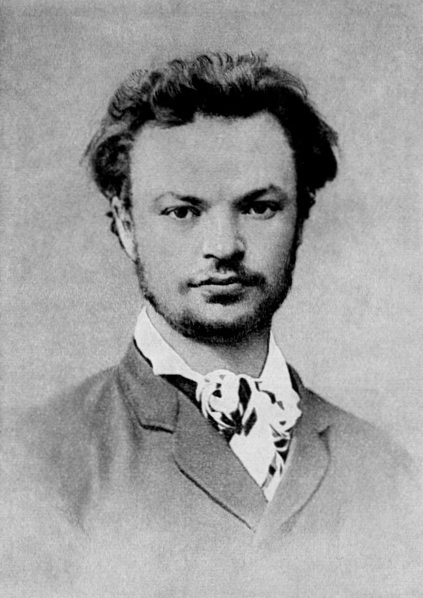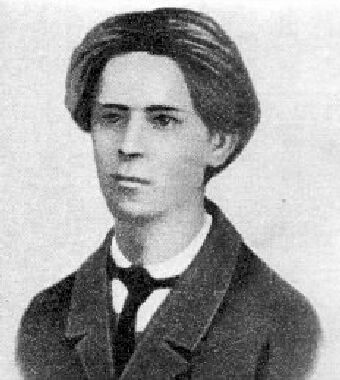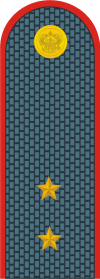|
Vladimir Kovalevsky
Vladimir Ivanovich Kovalevsky (; 10 November 1848, Balakliia, Novo-Serpukhov, Russian Empire – 2 November 1935, Leningrad, USSR) was a Russian statesman, scientist and entrepreneur. He was the author of numerous articles and works on agricultural themes. From 1892 to 1900, he was the director of the Commerce and Manufacturing Department of the Ministry of Finance of the Russian Empire, and one of the fathers of the concept of Russian protectionism. From 1900 to 1902, he was the Deputy Minister of Finance. From 1906 to 1916, he was the chairman of the Russian Technical Society. Kovalevsky was one of the creators of the Saint Petersburg State Polytechnical University and the Institute of Plant Industry in Leningrad. Life Early years Vladimir Kovalevsky was born to the middle-class family of a retired army major on 9 November 1848, in Novo-Serpukhov (currently Balakliia) in the Zmiiv, Zmiyov uyezd of the Kharkov Governorate. He was brought up in the Poltava Military School. ... [...More Info...] [...Related Items...] OR: [Wikipedia] [Google] [Baidu] |
Balakliia
Balakliia or Balakliya (, ; ) is a List of cities in Ukraine, city in the Izium Raion, Kharkiv Oblast, eastern Ukraine, on the northeast side of the Siverskyi Donets river close to where it is joined by the , which runs through the town. It is an important railroad junction in the Oblasts of Ukraine, oblast. Balakliia hosts the administration of Balakliia urban hromada, one of the hromadas of Ukraine. Population: Administrative status Until 18 July 2020, Balakliia was the administrative center of Balakliia Raion. The Raions of Ukraine, raion was abolished in July 2020 as part of the administrative reform of Ukraine, which reduced the number of raions of Kharkiv Oblast to seven. The area of Balakliia Raion was merged into Izium Raion. History Early history and etymology The land that is now Balakliia has been inhabited since ancient times. Settlements from the Neolithic Age and Bronze Age have been preserved. The name "Balakliia" is derived from the , a tributary of the Donet ... [...More Info...] [...Related Items...] OR: [Wikipedia] [Google] [Baidu] |
Uyezd
An uezd (also spelled uyezd or uiezd; rus, уе́зд ( pre-1918: уѣздъ), p=ʊˈjest), or povit in a Ukrainian context () was a type of administrative subdivision of the Grand Duchy of Moscow, the Tsardom of Russia, the Russian Empire, the Russian SFSR, and the early Soviet Union, which was in use from the 13th century. For most of Russian history, uezds were a second-level administrative division. By sense, but not by etymology, ''uezd'' approximately corresponds to the English "county". General description Originally describing groups of several volosts, they formed around the most important cities. Uezds were ruled by the appointees (''namestniki'') of a knyaz and, starting from the 17th century, by voyevodas. In 1708, an administrative reform was carried out by Peter the Great, dividing Russia into governorates. The subdivision into uyezds was abolished at that time but was reinstated in 1727, as a result of Catherine I's administrative reform. By the USSR administra ... [...More Info...] [...Related Items...] OR: [Wikipedia] [Google] [Baidu] |
Sergey Stepnyak-Kravchinsky
Sergey Mikhaylovich Stepnyak-Kravchinsky (; 13 July 1851 – 23 December 1895), known in 19th-century London revolutionary circles as Sergius Stepniak, was a Russian revolutionary. He is mainly known for assassinating General Nikolai Mezentsov, chief of Russia's Gendarme corps and head of secret police, with a dagger in the streets of St. Petersburg in 1878. Early life Stepniak, the son of an army doctor and a noblewoman, was born on in Novy Starodub, Aleksandriya uezd, Kherson Governorate, Russian Empire (now in Ukraine). He received a liberal education, and when he left school, he went on to attend the Military academy and graduated from the Mikhailovsky Artillery Institute before joining the Imperial Russian Army. He reached the rank of second lieutenant before resigning his commission in 1871. Revolutionary life His sympathy lay with the peasants, among whom he had lived during his boyhood in the country, which led him to develop democratic, and later revolutiona ... [...More Info...] [...Related Items...] OR: [Wikipedia] [Google] [Baidu] |
Circle Of Tchaikovsky
The Circle of Tchaikovsky, also known as Tchaikovtsy/Chaikovtsy/Tcaycoffsky (), or the Grand Propaganda Society (, ''Bolshoye obshchestvo propagandy'') was a Russian literary society for self-education and a revolutionary organization of the Narodniks in the early 1870s. It was named after Nikolai Tchaikovsky, one of its prominent members. Background and origin The intelligentsia of mid-nineteenth century Tsarist Russia were dissatisfied with what they saw as social stagnation of the nation and had begun to demand reform. Their attitude was called "nihilist" by Ivan Turgenev, explained by a character in his novel Fathers and Sons thus: "A nihilist is a man who does not bow down before any authority, who does not take any principle on faith, whatever reverence that principle may be enshrined in." The peak of this social activism gave rise to a number of secret organisations, among them Land and Liberty, People's Revenge, and the Circle of Tchaikovsky. The Circle was founded ... [...More Info...] [...Related Items...] OR: [Wikipedia] [Google] [Baidu] |
Probation
Probation in criminal law is a period of supervision over an offence (law), offender, ordered by the court often in lieu of incarceration. In some jurisdictions, the term ''probation'' applies only to community sentences (alternatives to incarceration), such as suspended sentences. In others, probation also includes supervision of those conditionally released from prison on parole. An offender on probation is ordered to follow certain conditions set forth by the court, often under the supervision of a probation officer. During the period of probation, an offender faces the threat of being incarcerated if found breaking the rules set by the court or probation officer. Offenders are ordinarily required to maintain law-abiding behavior, and may be ordered to refrain from possession of firearms, remain employed, participate in an educational program, abide by a curfew, live at a directed place, obey the orders of the probation officer, or not leave the jurisdiction. The probationer ... [...More Info...] [...Related Items...] OR: [Wikipedia] [Google] [Baidu] |
Acquitted
In common law jurisdictions, an acquittal means that the criminal prosecution has failed to prove that the accused is guilty beyond a reasonable doubt of the charge presented. It certifies that the accused is free from the charge of an offense, as far as criminal law is concerned. The finality of an acquittal is dependent on the jurisdiction. In some countries, such as the United States, an acquittal prohibits the retrial of the accused for the same offense, even if new evidence surfaces that further implicates the accused. The effect of an acquittal on criminal proceedings is the same whether it results from a jury verdict or results from the operation of some other rule that discharges the accused. In other countries, like Australia, Canada and the UK, the prosecuting authority may appeal an acquittal similar to how a defendant may appeal a conviction — but usually only if new and compelling evidence comes to light or the accused has interfered with or intimidated a ... [...More Info...] [...Related Items...] OR: [Wikipedia] [Google] [Baidu] |
Peter-Paul Fortress
The Peter and Paul Fortress () is the original citadel of Saint Petersburg, Russia, founded by Peter the Great in 1703 and built to Domenico Trezzini's designs from 1706 to 1740 as a star fortress. Between the first half of the 1700s and early 1920s it served as a prison for political criminals. It has been a museum since 1924. History From foundation until 1917 The fortress was established by Peter the Great on , on small Hare Island by the north bank of the Neva River. From around 1720, the fort served as a base for the city garrison and also as a prison for high-ranking or political prisoners. Russian Revolution and beyond During the February Revolution of 1917, it was attacked by mutinous soldiers of the Pavlovsky Life Guards Regiment on February 27 (O.S.) and the prisoners were freed. Under the Provisional Government, hundreds of Tsarist officials were held in the Fortress. The tsar was threatened with being incarcerated at the fortress on his return from Mogilev ... [...More Info...] [...Related Items...] OR: [Wikipedia] [Google] [Baidu] |
Sergey Nechayev
Sergey Gennadiyevich Nechayev (; – ) was a Russian anarcho-communist, part of the Russian nihilist movement, known for his single-minded pursuit of revolution by any means necessary, including revolutionary terror. Nechayev fled Russia in 1869 after having been involved in the , who disagreed with some actions of Nechayervites. Complicated relationships with fellow revolutionaries caused him to be expelled from the International Workingmen's Association. Arrested in Switzerland in 1872, he was extradited back to Russia where he received a twenty-year sentence and died in prison. Early life in Russia Nechayev was born in Ivanovo, then a small textile town, to poor parents—his father was a waiter and sign painter. His mother died when he was eight. His father remarried and had two more sons. They lived in a three-room house with his two sisters and grandparents. They were ex-serfs who had moved to Ivanovo. He had already developed an awareness of social inequality and a r ... [...More Info...] [...Related Items...] OR: [Wikipedia] [Google] [Baidu] |
Narodnik
The Narodniks were members of a movement of the Russian Empire intelligentsia in the 1860s and 1870s, some of whom became involved in revolutionary agitation against tsarism. Their ideology, known as Narodism, Narodnism or ,; , similar to the German was a form of agrarian socialism, though it is often misunderstood as populism. The Going to the People campaigns were the central impetus of the Narodnik movement. The Narodniks were in many ways the intellectual and political forebears and, in notable cases, direct participants of the Russian Revolution—in particular of the Socialist-Revolutionary Party, which went on to greatly influence Russian history in the early 20th century. Etymology ''Naród'' (see нарóдъ and нарóд) is the Russian word for people, nation. History Narodnichestvo as a philosophy was influenced by the works of Alexander Herzen (1812–1870) and Nikolay Gavrilovich Chernyshevsky (1828–1889), whose convictions were refined by Pyotr Lav ... [...More Info...] [...Related Items...] OR: [Wikipedia] [Google] [Baidu] |
Dmitry Lachinov
Dmitry Aleksandrovich Lachinov () (10 May 1842 – 15 October 1902) was a physicist, electrical engineer, inventor, meteorologist and climatologist from the Russian Empire. Biography Dmitry Lachinov studied in the St. Petersburg University, where he was a pupil of Heinrich Lenz, Pafnuty Chebyshev, and Feodor Petrushevsky. In 1862, when the University was closed because of the students' unrest, Lachinov went to Germany and for two and a half years studied there under the guidance of Gustav Kirchhoff, Robert Bunsen and Hermann von Helmholtz, Hermann Helmholtz, attending practical lessons in their laboratories in Heidelberg and Tübingen. In a paper released in 1880, Lachinov became the first one to point out the possibility of electricity transmission over long distances, and to propose the means of achieving it — 18 months before the first publication of the article with similar conclusions by Marcel Deprez. In 1889 Lachinov wrote the first textbook on meteorology and climato ... [...More Info...] [...Related Items...] OR: [Wikipedia] [Google] [Baidu] |
Ensign (rank)
Ensign (; Middle English#Late Middle English, Late Middle English, from Old French ["mark", "symbol", "signal"; "flag", "standard", "pennant"], from Latin [plural]) is a junior rank of a Officer (armed forces)#Commissioned officers, commissioned officer in the armed forces of some countries, normally in the infantry or navy. As the junior officer in an infantry regiment was traditionally the carrier of the Military colours, standards and guidons, regimental colors, the rank acquired the name "ensign". This rank has generally been replaced in army ranks by second lieutenant. An ensign was generally the lowest-ranking commissioned officer, except where the rank of Subaltern (military), subaltern existed. In contrast, the Arab rank of ensign, لواء, ''liwa (Arabic), liwa''', derives from the command of a unit with an ensign, not from the carrier of the unit's ensign, and is today the equivalent of major general. According to Thomas Venn's 1672 ''Military and Maritime Disci ... [...More Info...] [...Related Items...] OR: [Wikipedia] [Google] [Baidu] |
Praporschik
(, , ) is a rank used by the Russian Armed Forces and a number of former communist states. The rank is a non-commissioned officer's and is equivalent to in the corresponding navies. It is usually equivalent to warrant officer class 1 or sergeant major in English-speaking armies. Within NATO forces, the rank is rated as OR-7 or OR-8. Russia is a rank in the Russian military, also used in other uniformed services of the Russian government such as the police. It was a junior officer rank in Imperial Russia, but was abolished following the Russian Revolution. In 1940, the rank was restored as a separate career group between non-commissioned officers and officers. Imperial Russia was originally an Oberoffizer rank, as first introduced in Streltsy New Regiments. The name originates from Slavonic ''prapor'' (прапор), meaning flag; the ''praporshchik'' was a flag-bearer in Kievan Rus troops. In the New Regiments of the Streltsy and the "new army" of Peter the Great, '' ... [...More Info...] [...Related Items...] OR: [Wikipedia] [Google] [Baidu] |








